|
Advertisement / Annons: |
Planetary Nebula |
| Object : | M97, Owl Nebula |
| Coordinates/Direction : | center of image, RA 11h15m, Dec +54 55' |
| Object size : | 202" by 196" |
| Object magnitude : | 9.9 |
| More to know : |
Wikipedia: https://en.wikipedia.org/ wiki/ Owl Nebula |
M97 2024-02-01, 2024-02-03, 2024-02-04, 2024-02-05, crop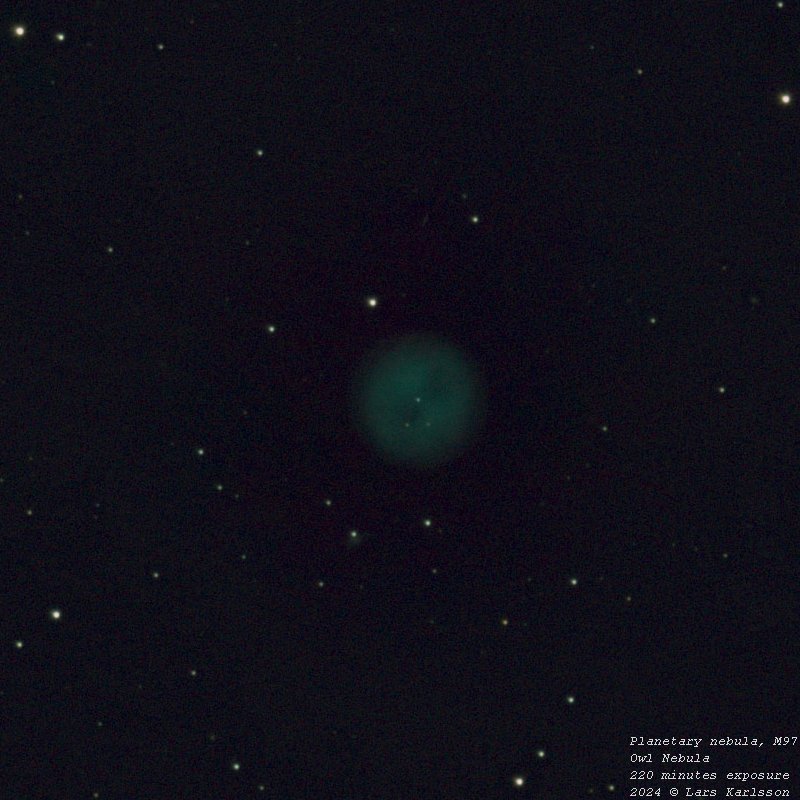 (Click on the image and get one high resolution image in a new window)
(Click on the image and get one high resolution image in a new window)
|
| Date : | 2024-02-01, 2024-02-03, 2024-02-04, 2024-02-05 |
| Time (UT) : | - |
| Mount : | SkyWatcher EQ6 Pro, Belt drive, beltdrive modified (DIY 2019) |
| Guide : | ASI120 camera with 400 mm f/6.3 lens |
| Lens/telescope : | TS130 APO f/7 910mm, 3" focuser |
| Corrector/Barlow : | 3" field flatter, x1. T48 connector to camera |
| Field (FOV) : | 2.25 x 1.5o (full frame) before crop |
| camera : | Canon 6D, QE=0.5, full frame, 20 Mpixel, 14 bit |
| camera temperature: | About 6o C above surrounding temperature |
| Film/CCD : | Raw, Cr2 |
| Filter : | none |
| Control system: | Mount, camera, focus, guide (Ekos) controlled by Astroberry (KStars/Ekos Linux) |
| Exp. time : | 111x120 seconds, 3 hours 42 minutes, iso1600 |
| Image process tool : | Siril, Gimp, Irfanview |
| Processing : | calibration bias, flat and astro metric color |
| Weather : | Clear sky, temperature -5o C |
| Site : | Sweden, Stockholm, Hagsätra.
Bortle 9 Free view Az: 20o to 90o, 165o to 185o, Alt: 20o to 55o |
| Comment : | More exposures, now it closing in at almost 4 hours. Is it enough ? No, you can add much more exposures and lower the noise even more. But in a low light pollution area it had been much better already with this exposure time. |
M97 2024-02-01, 2024-02-03, 2024-02-04, crop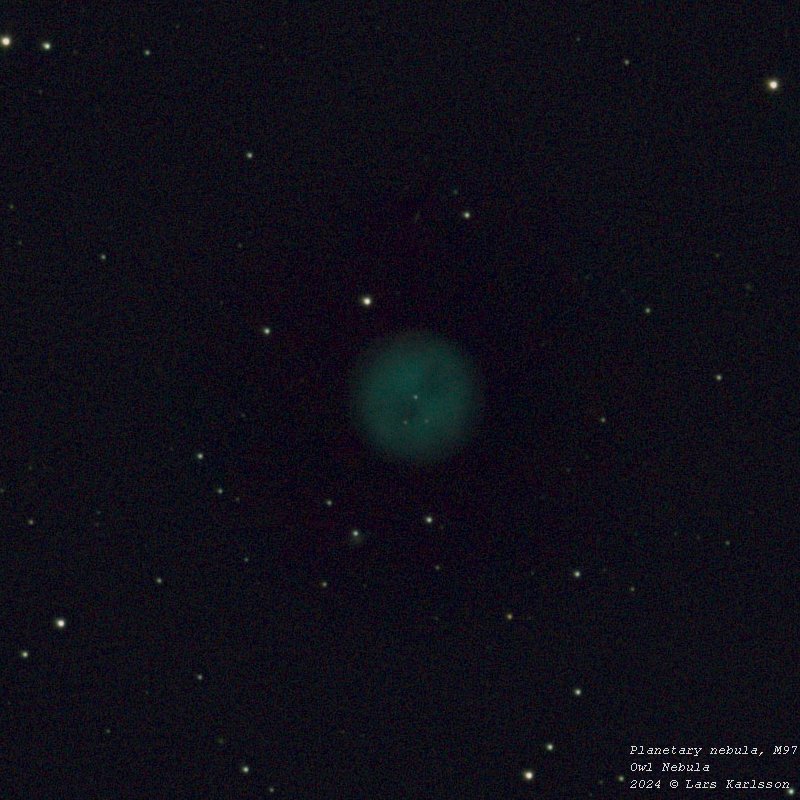 (Click on the image and get one high resolution image in a new window)
(Click on the image and get one high resolution image in a new window)
|
| Date : | 2024-02-01, 2024-02-03, 2024-02-04 |
| Time (UT) : | - |
| Mount : | SkyWatcher EQ6 Pro, Belt drive, beltdrive modified (DIY 2019) |
| Guide : | ASI120 camera with 400 mm f/6.3 lens |
| Lens/telescope : | TS130 APO f/7 910mm, 3" focuser |
| Corrector/Barlow : | 3" field flatter, x1. T48 connector to camera |
| Field (FOV) : | 2.25 x 1.5o (full frame) before crop |
| camera : | Canon 6D, QE=0.5, full frame, 20 Mpixel, 14 bit |
| camera temperature: | About 6o C above surrounding temperature |
| Film/CCD : | Raw, Cr2 |
| Filter : | none |
| Control system: | Mount, camera, focus, guide (Ekos) controlled by Astroberry (KStars/Ekos Linux) |
| Exp. time : | 70x120 seconds, iso1600 |
| Image process tool : | Siril, Gimp, Irfanview |
| Processing : | calibration bias, flat and astro metric color |
| Weather : | Clear sky, temperature -5o C |
| Site : | Sweden, Stockholm, Hagsätra.
Bortle 9 Free view Az: 20o to 90o, 165o to 185o, Alt: 20o to 55o |
| Comment : | Continue to add more exposures, three nights with 2 hours and 20 minutes of exposure. The noise is even more reduced with that. |
M97 2024-02-04, crop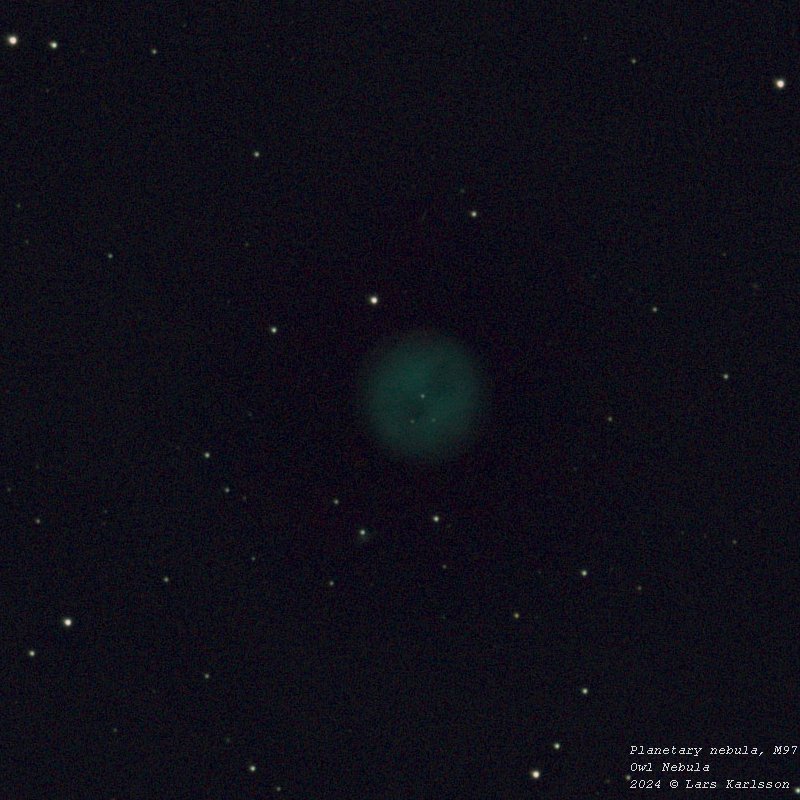 (Click on the image and get one high resolution image in a new window)
(Click on the image and get one high resolution image in a new window)
|
| Date : | 2024-02-04 |
| Time (UT) : | 19:02 - 21:15 |
| Mount : | SkyWatcher EQ6 Pro, Belt drive, beltdrive modified (DIY 2019) |
| Guide : | ASI120 camera with 400 mm f/6.3 lens |
| Lens/telescope : | TS130 APO f/7 910mm, 3" focuser |
| Corrector/Barlow : | 3" field flatter, x1. T48 connector to camera |
| Field (FOV) : | 2.25 x 1.5o (full frame) before crop |
| camera : | Canon 6D, QE=0.5, full frame, 20 Mpixel, 14 bit |
| camera temperature: | About 6o C above surrounding temperature |
| Film/CCD : | Raw, Cr2 |
| Filter : | none |
| Control system: | Mount, camera, focus, guide (Ekos) controlled by Astroberry (KStars/Ekos Linux) |
| Exp. time : | 37x120 seconds, iso1600 |
| Image process tool : | Siril, Gimp, Irfanview |
| Processing : | calibration bias, flat and astro metric color |
| Weather : | Clear sky, temperature -1o C |
| Site : | Sweden, Stockholm, Hagsätra.
Bortle 9 Free view Az: 20o to 90o, 165o to 185o, Alt: 20o to 55o |
| Comment : | One more night with clear sky. Some problem with the guide camera and I had to go back to the Ekos internal guider. This night I could use 37 photos compare to the night before when I only got 28 photos. Not big difference but it can be seen that it has less noise. Later when I got more photos I can stack them all. |
M97 2024-02-03, crop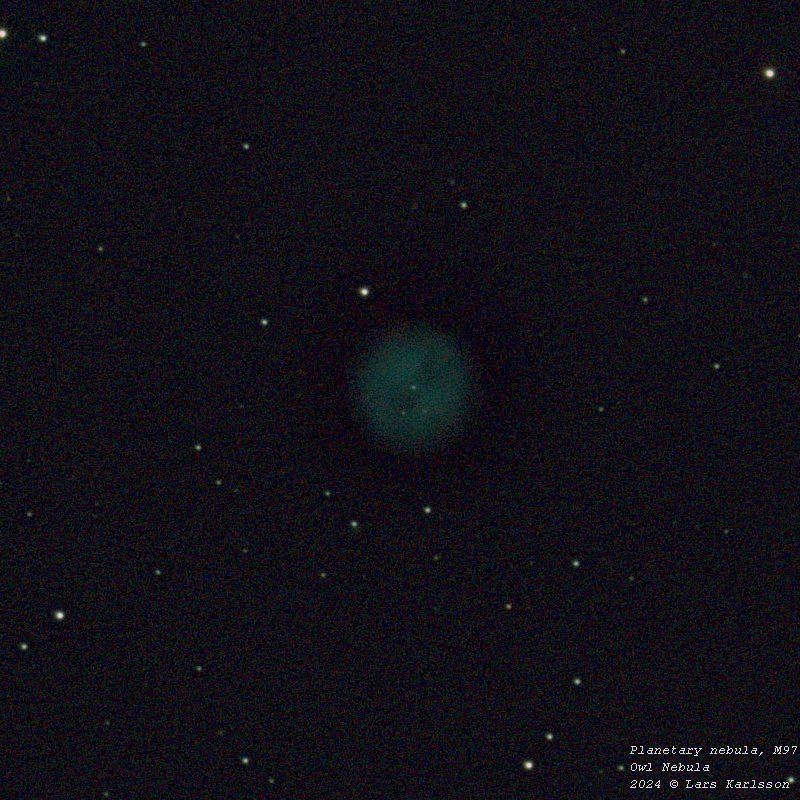 (Click on the image and get one high resolution image in a new window)
(Click on the image and get one high resolution image in a new window)
|
| Date : | 2024-02-03 |
| Time (UT) : | 17:59 - 19:54 |
| Mount : | SkyWatcher EQ6 Pro, Belt drive, beltdrive modified (DIY 2019) |
| Guide : | ASI120 camera with 400 mm f/6.3 lens |
| Lens/telescope : | TS130 APO f/7 910mm, 3" focuser |
| Corrector/Barlow : | 3" field flatter, x1. T48 connector to camera |
| Field (FOV) : | 2.25 x 1.5o (full frame) before crop |
| camera : | Canon 6D, QE=0.5, full frame, 20 Mpixel, 14 bit |
| camera temperature: | About 6o C above surrounding temperature |
| Film/CCD : | Raw, Cr2 |
| Filter : | none |
| Control system: | Mount, camera, focus, guide (PHD2) controlled by Astroberry (KStars/Ekos Linux) |
| Exp. time : | 28x120 seconds, iso1600, of these 28 only 18 could be used |
| Image process tool : | Siril, Gimp, Irfanview |
| Processing : | calibration bias, flat and astro metric color |
| Weather : | Clear sky, temperature +5o C |
| Site : | Sweden, Stockholm, Hagsätra.
Bortle 9 Free view Az: 20o to 90o, 165o to 185o, Alt: 20o to 55o |
| Comment : | New for this photo is that I use the PHD2 software to control the auto guiding. More because I had some problem with the guide camera. A side effect of that was that I got better precision on the guiding and then sharper stars. The three stars inside the nebula can clearly be seen. The noise is less because of twice the exposure time. If I collect 2 or 4 hour of exposure time it will be fine, I can add them from different nights. |
M97 2024-01-05, crop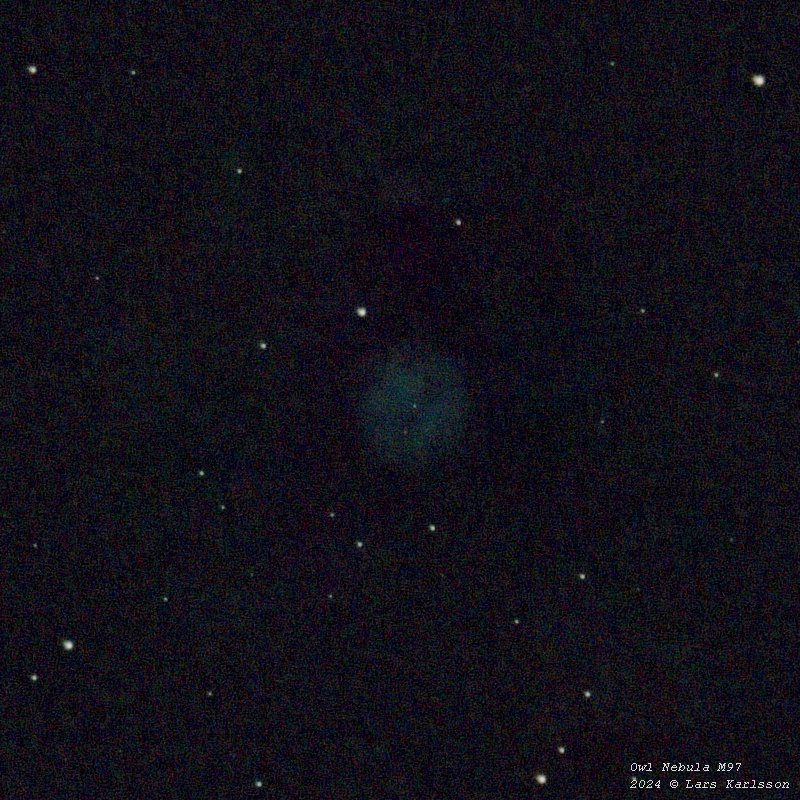
|
| Date : | 2024-01-05 |
| Time (UT) : | 20:05 - 20:41 |
| Mount : | SkyWatcher EQ6 Pro, Belt drive, beltdrive modified (DIY 2019) |
| Guide : | ASI120 camera with 400 mm f/6.3 lens |
| Lens/telescope : | TS130 APO f/7 910mm, 3" focuser |
| Corrector/Barlow : | 3" field flatter, x1. T48 connector to camera |
| Field (FOV) : | 2.25 x 1.5o (full frame) before crop |
| camera : | Canon 6D, QE=0.5, full frame, 20 Mpixel, 14 bit |
| camera temperature: | About 6o C above surrounding temperature |
| Film/CCD : | Raw, Cr2 |
| Filter : | none |
| Control system: | Mount, camera, focus, guide (Ekos) controlled by Astroberry (KStars/Ekos Linux) |
| Exp. time : | 26x60 seconds, iso1600 |
| Image process tool : | Siril, Gimp, Irfanview |
| Processing : | calibration bias, flat and astro metric color |
| Weather : | Thin clouds, quarter Moon, temperature -12o C |
| Site : | Sweden, Stockholm, Hagsätra.
Bortle 9 Free view Az: 20o to 90o, 165o to 185o, Alt: 20o to 55o |
| Comment : | The clouds was against me and I only got a few photos. Very noisy because of the short exposure time, needs at least 4 hours. But what I can see is that the focuser has worked pretty well. |
M97 2023-10-13, crop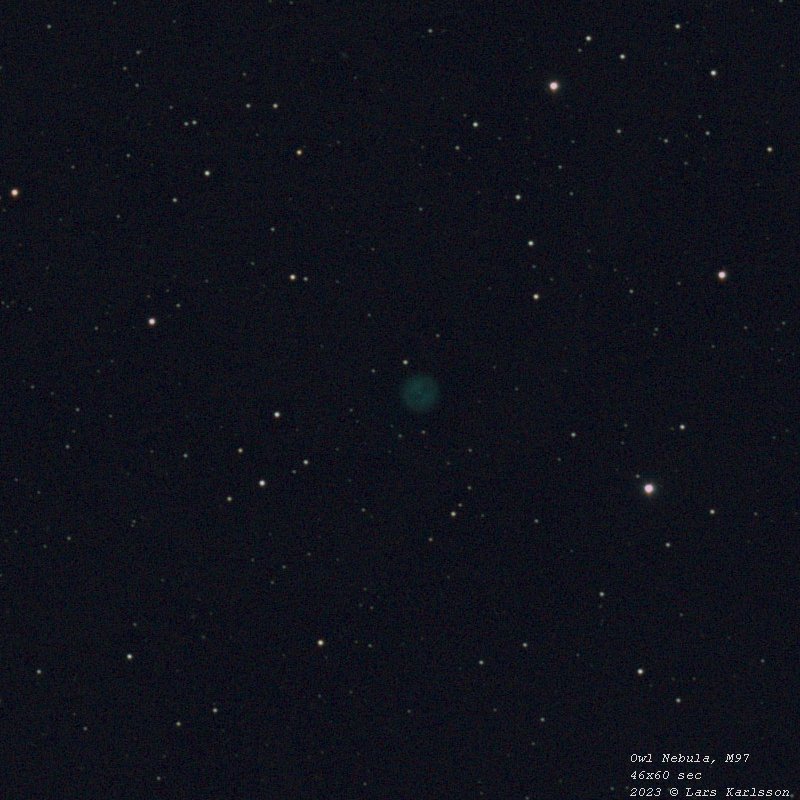 (Click on image to get one in full resolution in a new window)
(Click on image to get one in full resolution in a new window)
|
| Date : | 2023-10-13 |
| Time (UT) : | 00:07 - 01:17 |
| Mount : | SkyWatcher HEQ5, belt modified, low rider |
| Guide : | QHY5 camera with 200 mm f/3.5 lens |
| Lens/telescope : | Pentax 645 300 mm ED f/4 (medium format lens) |
| Corrector/Barlow : | - |
| Field (FOV) : | 6.8x4.5o (full frame) before crop |
| camera : | Canon 6D, QE=0.5, full frame, 20 Mpixel, 14 bit |
| camera temperature: | About 6o C above surrounding temperature |
| Film/CCD : | Raw, Cr2 |
| Filter : | none |
| Control system: | Mount, camera, focus, guide (Ekos) controlled by Astroberry (KStars/Ekos Linux) |
| Exp. time : | 44x60 seconds, iso1600 |
| Image process tool : | Siril, Gimp, Irfanview |
| Processing : | cal bias, flat and astro metric color calibration |
| Weather : | Thin clouds 25% during night |
| Site : | Sweden, Stockholm, Hagsätra.
Bortle 9 Free view Az: 20o to 90o, 165o to 185o, Alt: 20o to 55o |
| Comment : | Planetary nebulas are small objects, a few arc minutes wide. It's preferable to have long focal lengths, 2000 mm or so. In this case I use my 300 mm lens. Other exciting objects can be identified on this plate solved image: M97 Astrometry. |
M97 2023-10-13, crop & Zoom 2x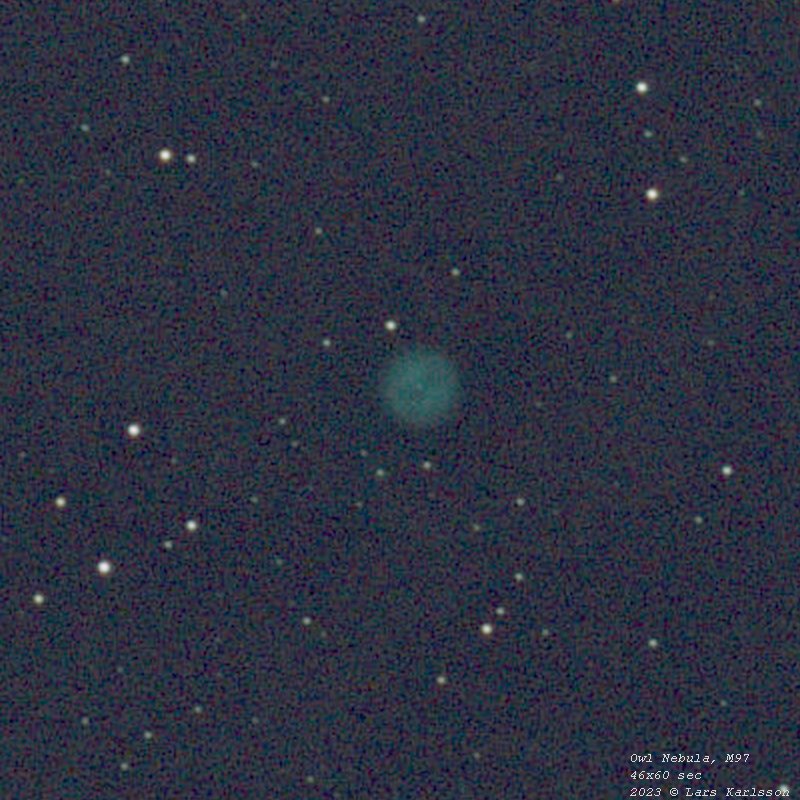
|
| Date : | 2023-10-13 |
| Time (UT) : | 00:07 - 01:17 |
| Comment : | Zoom in at 2x on the cropped image and crank up the color saturation. The color is easy to see but very noisy. A 3 hour exposure had been better. Planetary nebulas is the left over from an exploded star, the stars particles are like a big cloud where the once was. Compare with photos below taken with different focal lenghts. |
M97 2020-01-22, TS130 910 mm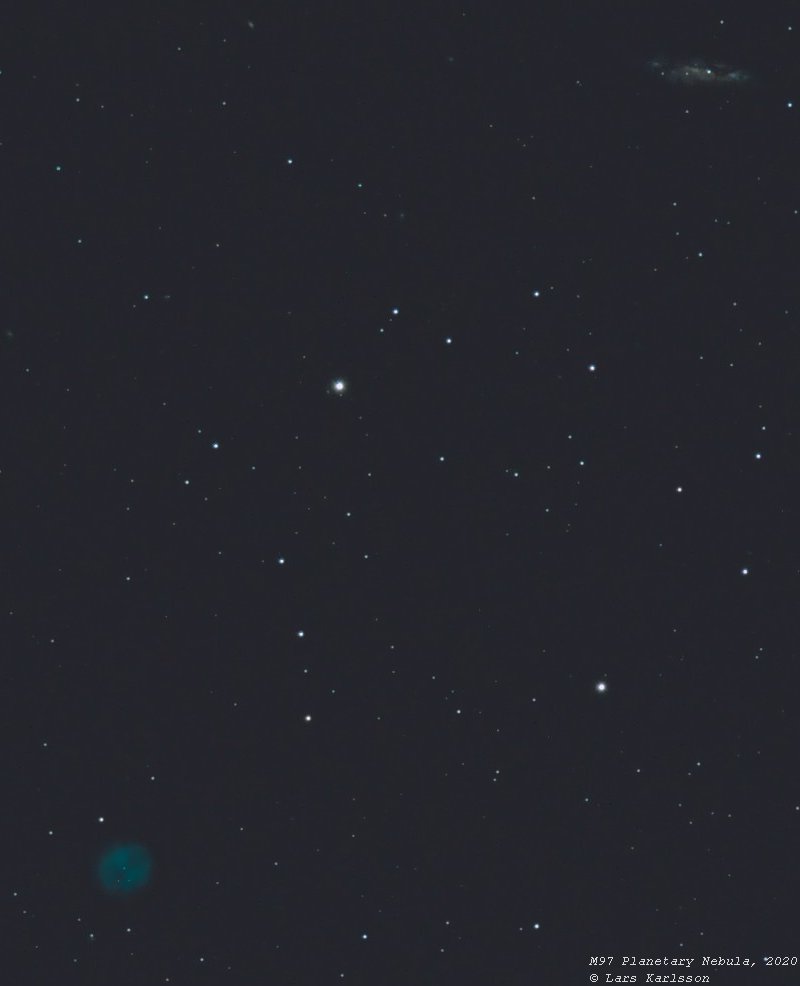 (Click on image for a full resolution, opens in a new window)
(Click on image for a full resolution, opens in a new window)
|
| Date : | 2020-01-22 |
| Time (UT) : | 20:32 - 22:40 |
| Mount : | SkyWatcher EQ6 Pro, Belt drive, beltdrive modified (DIY 2019) |
| Guide : | QHY5 camera with 400 mm f/6.3 lens |
| Lens/telescope : | TS130 APO f/7 910mm, 3" focuser |
| Corrector/Barlow : | 3" field flatter, x1. T48 connector to camera |
| Field (FOV) : | 2.25 x 1.5o (full frame) before crop |
| camera : | Canon 6D, QE=0.5, full frame, 20 Mpixel, 14 bit |
| camera temperature: | About 6o C above surrounding temperature |
| Film/CCD : | Raw, Cr2 |
| Filter : | none |
| Control system : | Mount by EQMOD, camera by APT, guide by PHD2, focuser by USB-focus, ASCOM Windows PC |
| Exp. time : | 42 x 60 seconds + 16 x 120 seconds at ISO1600 (HDR), dithering mode |
| Image process tool : | AstroImageJ, Fitswork, Irfanview |
| Processing : | Flat calibrated, high contrast, gamma 5, level, color, noise filter |
| Weather : | Clear sky, temperature +2o C |
| Site : | Sweden, Stockholm, Hagsätra.
Bortle 9 Free view Az: 20o to 90o, 165o to 185o, Alt: 20o to 55o |
| Comment : | This night the sky was darker than what I normally have. Look how the noise goes down. There is a galaxy too in the image: galaxy M108. The back ground is much better this time, less light pollution and a noise filter applied in the image process. The whole field that the telescope deliver to a full frame camera, 3 x 2 degrees, as you see the planetary nebula is very small. The image consist of two different exposures times to achieve a better dynamic, HDR photo. |
M97 2020-01-08, TS130 910 mm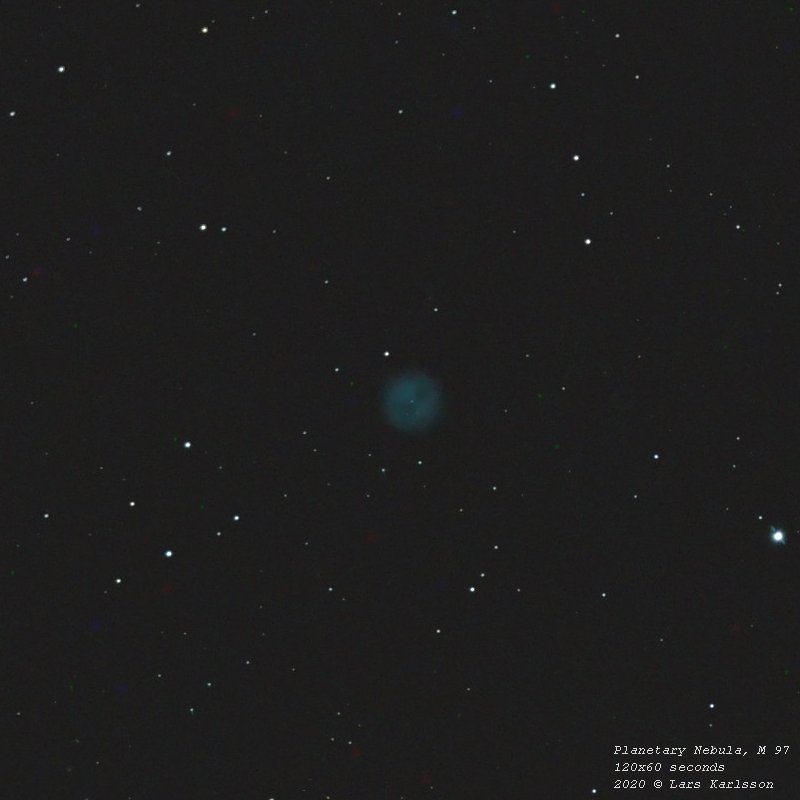 (Click on image for a full resolution, opens in a new window)
(Click on image for a full resolution, opens in a new window)
|
| Date : | 2020-01-08 |
| Time (UT) : | 20:39 - 23:31 |
| Mount : | SkyWatcher EQ6 Pro, Belt drive, beltdrive modified (DIY 2019) |
| Guide : | QHY5 camera with 400 mm f/6.3 lens |
| Lens/telescope : | TS130 APO f/7 910mm, 3" focuser |
| Corrector/Barlow : | 3" field flatter, x1. T48 connector to camera |
| Field (FOV) : | 2.25 x 1.5o (full frame) before crop |
| camera : | Canon 6D, QE=0.5, full frame, 20 Mpixel, 14 bit |
| camera temperature: | About 6o C above surrounding temperature |
| Film/CCD : | Raw, Cr2 |
| Filter : | none |
| Control system : | Mount by EQMOD, camera by APT, guide by PHD2, focuser by USB-focus, ASCOM Windows PC |
| Exp. time : | 120 x 60 seconds, dithering mode |
| Image process tool : | AstroImageJ, Fitswork, Irfanview |
| Processing : | Flat calibrated, high contrast, gamma 5, level, color, noise filter |
| Weather : | Clear sky, temperature +2o C |
| Site : | Sweden, Stockholm, Hagsätra.
Bortle 9 Free view Az: 20o to 90o, 165o to 185o, Alt: 20o to 55o |
| Comment : | Here I got a lot of exposure, 2 hours in total. It helps to reduce the noise. |
M97 2019-01-20, TS130 910 mm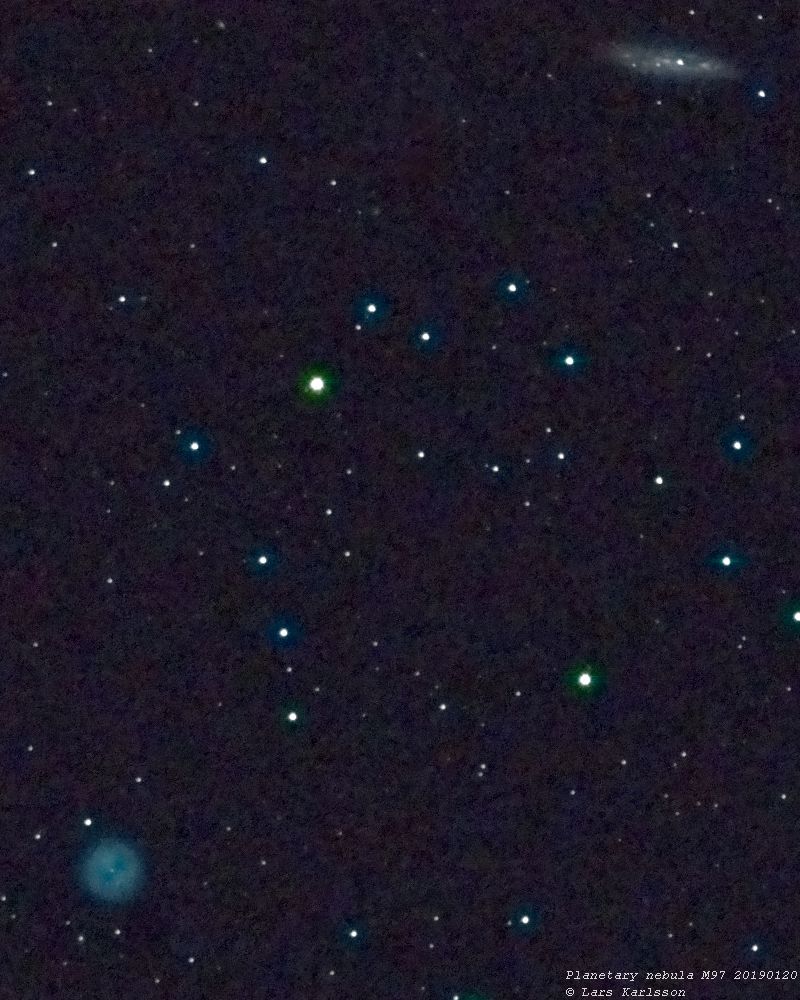
|
| Date : | 2019-01-20 |
| Time (UT) : | -- |
| Mount : | SkyWatcher EQ6 Pro, Belt drive, beltdrive modified (DIY 2019) |
| Guide : | QHY5 camera with 400 mm f/6.3 lens |
| Lens/telescope : | TS130 APO f/7 910mm, 3" focuser |
| Corrector/Barlow : | 3" field flatter, x1. T48 connector to camera |
| Field (FOV) : | 2.25 x 1.5o (full frame) before crop |
| camera : | Canon 6D, QE=0.5, full frame, 20 Mpixel, 14 bit |
| camera temperature: | About 6o C above surrounding temperature |
| Film/CCD : | Raw, Cr2 |
| Filter : | none |
| Control system : | Mount by EQMOD, camera by APT, guide by PHD2, focuser by USB-focus, ASCOM Windows PC |
| Exp. time : | 228x30 second ISO1600 |
| Image process tool : | AstroImageJ, Fitswork, Irfanview |
| Processing : | crop 1:1, resize, stretch, flatten |
| Weather : | Clear sky |
| Site : | Sweden, Stockholm, Hagsätra.
Bortle 9 Free view Az: 20o to 90o, 165o to 185o, Alt: 20o to 55o |
| Comment : | New test, this time I reduce the sub image exposure to 30 second and took 228 photos of the object. It looks very noisy, better to try ISO 1600 or ISO3200 next time which give lower readout noise, but will also reduce the dynamic range a lot. A telescope with a focal length of 2000 mm had also been good. |
M97 2017-12-21, TS130 910 mm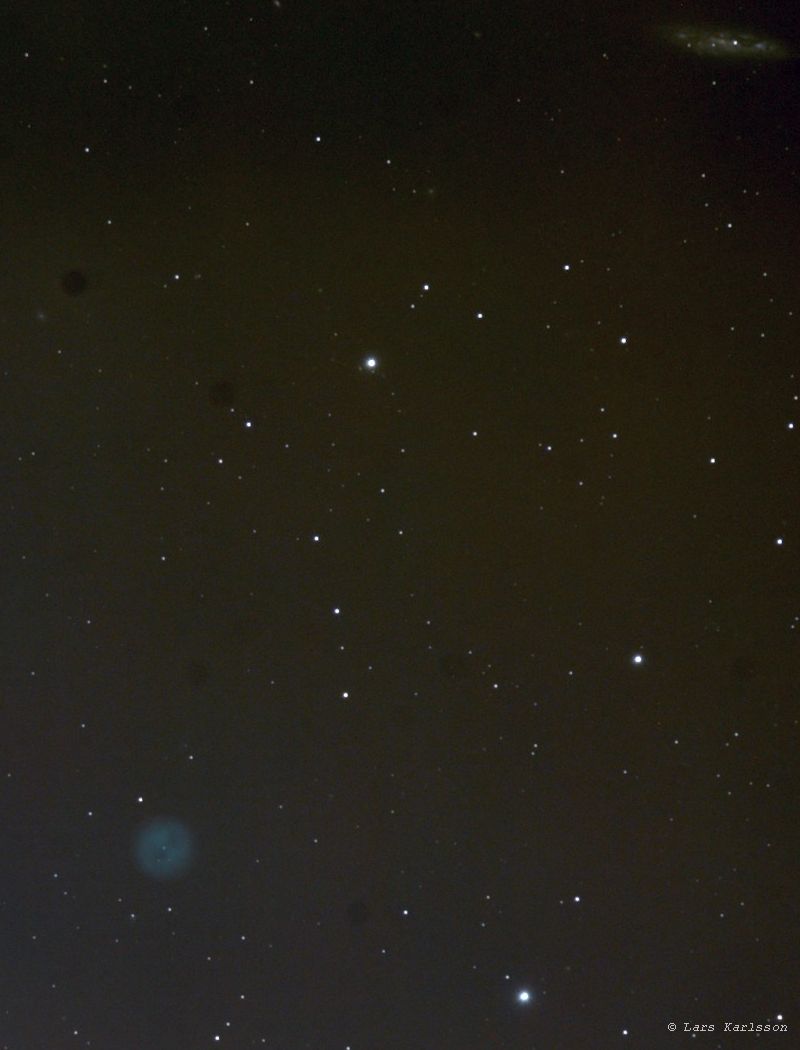
|
| Date : | 2017-12-21 |
| Time (UT) : | -- |
| Mount : | SkyWatcher EQ6 Pro, Belt drive, beltdrive modified (DIY 2019) |
| Guide : | QHY5 camera with 400 mm f/6.3 lens |
| Lens/telescope : | TS130 APO f/7 910mm, 3" focuser |
| Corrector/Barlow : | 3" field flatter, x1. T48 connector to camera |
| Field (FOV) : | 2.25 x 1.5o (full frame) before crop |
| camera : | Canon 6D, QE=0.5, full frame, 20 Mpixel, 14 bit |
| camera temperature: | About 6o C above surrounding temperature |
| Film/CCD : | Raw, Cr2 |
| Filter : | none |
| Control system : | Mount by EQMOD, camera by APT, guide by PHD2, focuser by USB-focus, ASCOM Windows PC |
| Exp. time : | 65x60 second ISO800 + 21x60 second ISO1600 (HDR), dithering mode |
| Image process tool : | AstroImageJ, Fitswork, Irfanview |
| Processing : | crop 1:1, resize, stretch, flatten |
| Weather : | a bit foggy but otherwise clear |
| Site : | Sweden, Stockholm, Hagsätra.
Bortle 9 Free view Az: 20o to 90o, 165o to 185o, Alt: 20o to 55o |
| Comment : | My first image with my new setup with the 3" field flattener.
Not very big success with the cleaning of the sensor, no flat field calibration at this stage. A planetary nebula is the left over from an old stellar explosion. The galaxy upper right corner is M108. |
M97 2017-12-21, TS130 910 mm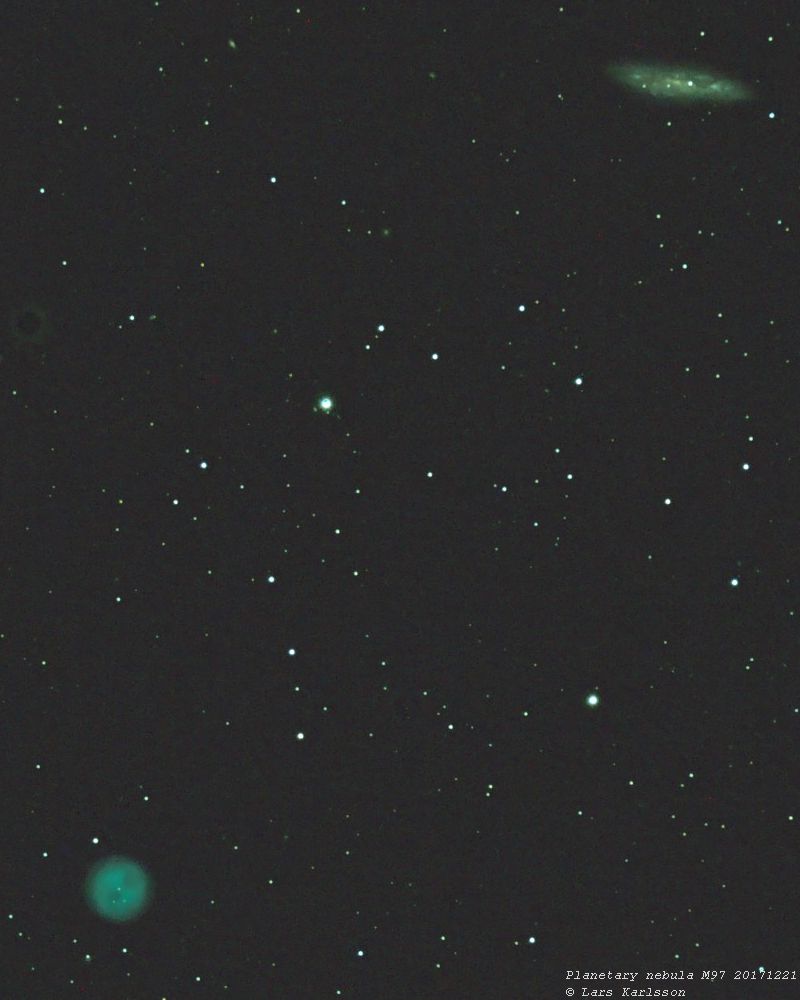
|
| Comment : | With a noise filter and flatten of the background it looks like this |
M97, TS130 682 mm, test with three different lenses, test 1.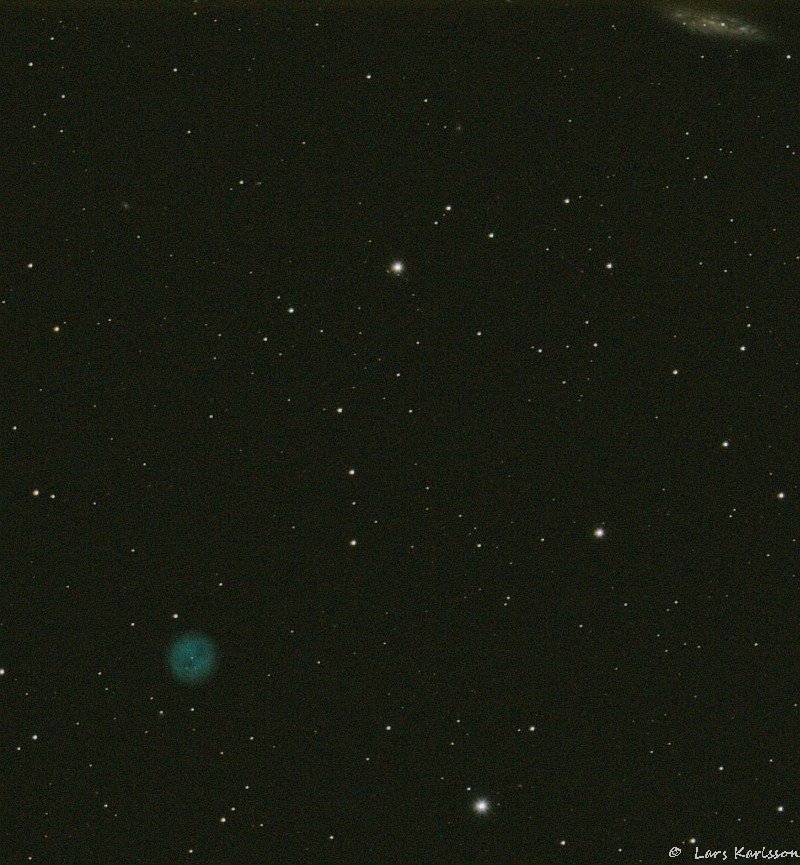
|
| Date : | 2015-11-21 |
| Time (UT) : | -- |
| Mount : | SkyWatcher EQ6 Pro, Belt drive, beltdrive modified (DIY 2019) |
| Guide : | QHY5 camera with off-axis |
| Lens/telescope : | TS130 APO f/7 910mm (682mm, f/5.2), 3" focuser |
| Corrector/Barlow : | Riccardi 2.5" field flatter, x0.75. T48 connector to camera |
| Field (FOV) : | 3.0 x 2.0o (full frame) before crop |
| camera : | Canon 6D, QE=0.5, full frame, 20 Mpixel, 14 bit |
| camera temperature: | About 6o C above surrounding temperature |
| Film/CCD : | Raw, Cr2 |
| Filter : | none |
| Control system : | Mount by EQMOD, camera by APT, guide by PHD2, focuser by USB-focus, ASCOM Windows PC |
| Exp. time : | 22x60 second, ISO800, dithering mode |
| Image process tool : | Fitswork, Irfanview |
| Processing : | crop, resize, stretch, flatten |
| Weather : | clear |
| Site : | Sweden, Stockholm, Hagsätra.
Bortle 9 Free view Az: 20o to 90o, 165o to 185o, Alt: 20o to 55o |
| Comment : | Three test photos with three different lenses and telescope. shot from my balcony, very light polluted sky. A planetary nebula is the left over from an old stellar explosion. The galaxy upper right corner is M108. |
M97, Pentax 500 mm, test with three different lenses, test 2.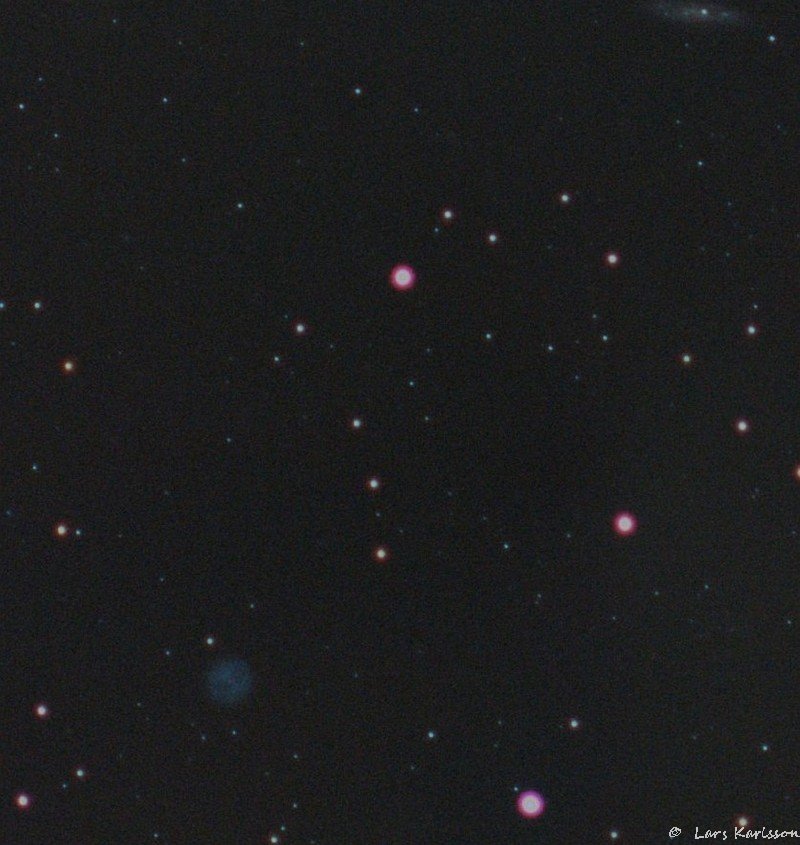
|
| Date : | 2013-11-28 |
| Time (UT) : | -- |
| Mount : | SkyWatcher EQ6 Pro, Belt drive, beltdrive modified (DIY 2019) |
| Lens/telescope : | Pentax 500 mm f/4.5 (medium/35mm format lens) |
| Corrector/Barlow : | - |
| Field (FOV) : | 4.1x2.7o (full frame) before crop |
| camera : | Canon 5D Mk I, QE=0.25, full frame, 12 Mpixel, 12 bit |
| camera temperature: | About 3o C above surrounding temperature |
| Film/CCD : | Raw, Cr2 |
| Filter : | none |
| Exp. time : | 30x60 second, ISO1000 |
M97, Pentax 165 mm, test with three different lenses, test 3. |
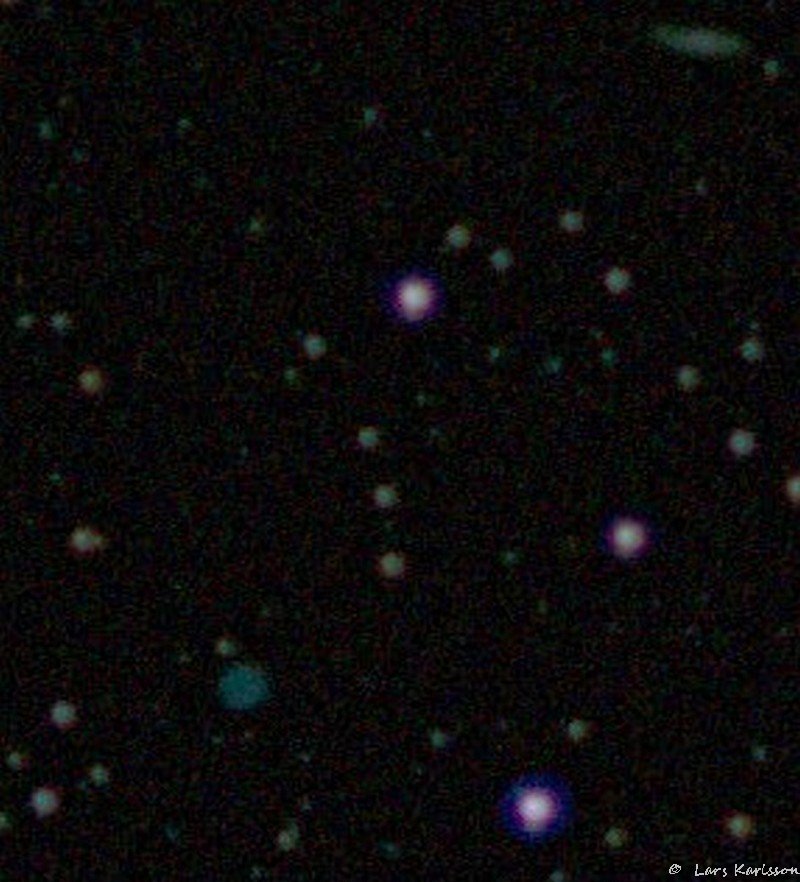 |
| Date : | 2013-11-25 |
| Time (UT) : | -- |
| Mount : | SkyWatcher EQ6 Pro, Belt drive, beltdrive modified (DIY 2019) |
| Lens/telescope : | Pentax 67 165 mm f/2.8 (medium format lens) |
| Corrector/Barlow : | - |
| Field (FOV) : | 12.4x8.3o (full frame) before crop |
| camera : | Canon 5D Mk I, QE=0.25, full frame, 12 Mpixel, 12 bit |
| camera temperature: | About 3o C above surrounding temperature |
| Film/CCD : | Raw, Cr2 |
| Filter : | none |
| Exp. time : | 25x30 second, ISO1000 |
|
| Go Back |